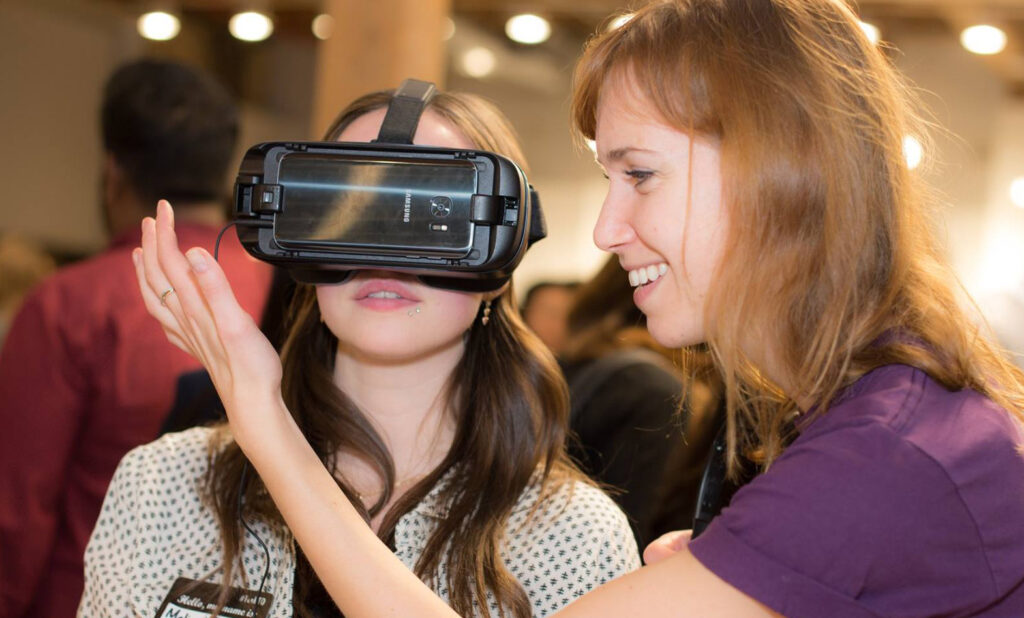
New research out of York University demonstrates that virtual reality (VR) therapy could significantly improve mood and even manage symptoms in older adults living with cognitive impairments.
By Krista Davidson
For older adults living with dementia and Alzheimer’s, and other cognitive impairments, there are few treatments beyond medication that promote well-being; however, new research published in the Journal of Prevention of Alzheimer’s Disease demonstrates VR therapy could significantly improve mood and even manage symptoms in older adults, which in turn helps them age in place longer.
VR is a computer-generated 3D environment that allows users to control some degree of their experience, such as where and what they see, and even how they interact with objects in that 3D world. It has become an invaluable tool for training and simulation for dangerous and high-risk real-world scenarios, from surgery to air flight simulation for pilots. Lora Appel, an assistant professor in the Faculty of Health at York University and her team are looking to VR therapy to improve the mood and behavior of frail older adults living with cognitive, sensory and/or mobility impairment.

Appel is collaborating with Baycrest's Centre for Aging and Brain Health Innovation and Michael Garron Hospital to investigate the use of VR therapy with individuals who have been admitted to the hospital with dementia. The research is supported by Toronto’s University Health Network and includes a randomized control trial (RCT) consisting of 77 participants.
“There has been significant growth in VR technology over the past few years, specifically around the creation of more human-like and realistic scenes, which makes it a good tool for building empathy within technology,” says Appel.
The research found that VR therapy was effective in treating and managing apathy and aggression, as well as improving overall mood among individuals with cognitive decline. It indicated that the use of VR therapy could provide an alternative, non-pharmacological treatment for people with cognitive impairments. In addition, VR therapy could play an important role in improving the quality of life for those with dementia living in long-term care.
Appel was inspired by a research collaboration she has with Toronto General Hospital, which includes patients who were unable to leave their hospital rooms to go outside due to the nature of their conditions (impaired mobility, lack of personnel, general frailty).
“We all know that experiencing nature promotes well-being, so it made me wonder if simulating the experience of nature could produce a similar effect,” explains Appel.
Appel and her team started out with creative scenes of nature and quickly progressed to other scenes that may have more meaning or impact, such as reminiscence therapy, in which individuals are shown images or objects that may trigger memories from previous experiences. For example, simulating the environment or country where they grew up.

Appel’s team is about to embark on another pilot study in early April, and subsequent clinical trial involving close to 100 participant-dyads (person living with dementia and their primary caregiver). Partnering with the MIVE lab at the Toronto Rehabilitation Institute and collaborating with community health partners such as Circle of Care and Acclaim Health, the research will investigate how VR might impact communication and relationship building of people with dementia. It will consider how much customization is needed to simulate a more meaningful experience or environment, and whether simulations that trigger memories of the past will have positive or negative outcomes.
She recalls at a recent RCT at a hospital with an older French participant who was paid a visit by a daughter. The participant, who was typically non-communicative, became very animated, laughing and making jokes. The daughter recorded videos of the experience to send to her family in France.
“No intervention is going to be for everyone, but the results are predominantly positive and when you see the impact that VR therapy can have for individuals, it sticks with you for a long time,” she says.
VR therapy can also have positive impacts for hospital staff and family members and other caregivers. Hospital staff can use VR therapy to relax individuals and minimize the pain associated with events such as changing wound dressings and other uncomfortable medical procedures. For caregivers, it can reduce the burdens of caretaking and provide temporary relief that permits them to look after their own self-care.
“I’m so excited about this field right now, it has so much potential for the future of health,” she says. “If my grandmother could no longer visit Romania for whatever reason and we wanted to experience that together, we could safely do that via VR.
“If a family member wanted to contribute to the care of a parent but they lived in a different location, VR could be a way they could have shared experiences,“ says Appel. “VR, in a sense, brings people together.”
Appel is working on several projects that use VR therapy, including the use of VR to minimize anxiety for children who are being vaccinated. She has published research on VRCHIVE, a workshop series that examines the feasibility of running a remote, intergenerational VR storytelling workshop through the Toronto Public Library.
She’s also involved with the CVRRICULUM (CVR) program which takes traditional assignments and adapts them into a VR deliverable to support experiential learning for students.
